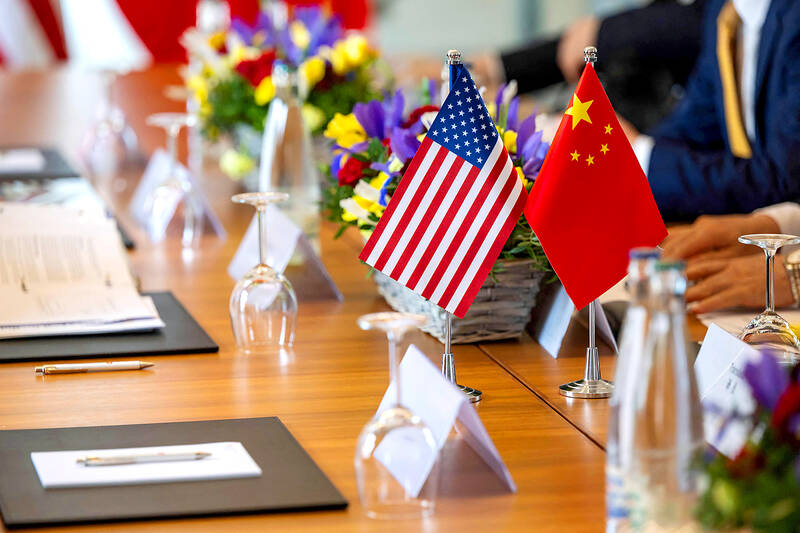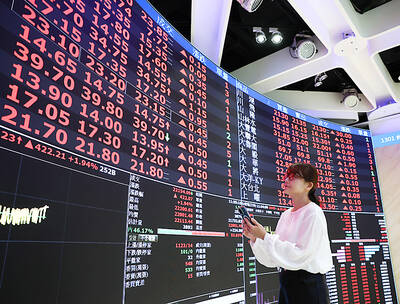US-China tech tensions are flaring again, with Beijing threatening legal action against anyone enforcing Washington’s restrictions on Huawei Technologies Co’s (華為) chips, casting a shadow over a recent trade truce and efforts to sustain dialogue.
The Chinese Ministry of Commerce said in a statement yesterday that entities could breach its Anti-foreign Sanctions Law by assisting in the US curbs, without specifying the punishment.
The move escalates the tech dispute even as Chinese officials express their wish to improve relations.

Photo: AFP / FDFA / Martial Trezzini
The US Department of Commerce had warned that using the Huawei semiconductors “anywhere in the world” would violate US export controls before later removing the place reference.
China has said that the US administration’s actions on chips undermined recent trade talks in Geneva, Switzerland.
Wu Xinbo (吳心伯), director at Fudan University’s Center for American Studies in Shanghai, said that the amendment suggests continued contact between the two sides, at least at the working level.
“The challenge is how both sides can keep the momentum gained from the Geneva talks,” Wu said. “I hope there can be high-level talks next month, but nothing’s guaranteed at the moment.”
On the same day of the Chinese warning, Chinese Vice Minister of Foreign Affairs Ma Zhaoxu (馬朝旭) told US Ambassador to China David Perdue that Beijing hopes the US would work together to promote ties.
This followed a meeting the day before between People’s Bank of China Governor Pan Gongsheng (潘功勝) and former US secretary of the treasury Timothy Geithner, now chairman of Warburg Pincus LLC, according to a brief statement from the central bank.
In a separate sit-down between Chinese Minister of Foreign Affairs Wang Yi (王毅) and Asia Society chief executive officer Kang Kyung-wha on Tuesday, China’s top diplomat said that China and the US should work toward finding the right way to get along by fostering positive engagement in the Asia-Pacific region first.
The flurry of exchanges comes after high-level talks in Switzerland earlier this month, where both nations agreed to a 90-day pause in some reciprocal tariffs, although substantial levies remain on Chinese imports.
These interactions appear to be part of Beijing’s effort to maintain dialogue while conflicts concerning US curbs on semiconductors and China’s control over critical minerals show little sign of resolution.
China’s alleged role in fentanyl’s flow into the US also remains a significant point of contention, with US officials pressing China for greater cooperation.
The simultaneous trade thaw and persistent dispute over access to technology underscore the challenge of resolving the economic conflict between the world’s two largest economies.
“My instinct is that tariffs are on a somewhat independent track from weaponizing supply chains. The logic is different,” said Graham Webster, who leads the DigiChina project at the Stanford University Cyber Policy Center.
Webster said that if the countries reach a more comprehensive trade deal, “the tech restrictions on one or both sides will be on the table.”

UNCERTAINTIES: Exports surged 34.1% and private investment grew 7.03% to outpace expectations in the first half, although US tariffs could stall momentum The Chung-Hua Institution for Economic Research (CIER, 中華經濟研究院) yesterday raised its GDP growth forecast to 3.05 percent this year on a robust first-half performance, but warned that US tariff threats and external uncertainty could stall momentum in the second half of the year. “The first half proved exceptionally strong, allowing room for optimism,” CIER president Lien Hsien-ming (連賢明) said. “But the growth momentum may slow moving forward due to US tariffs.” The tariff threat poses definite downside risks, although the scale of the impact remains unclear given the unpredictability of US President Donald Trump’s policies, Lien said. Despite the headwinds, Taiwan is likely

READY TO BUY: Shortly after Nvidia announced the approval, Chinese firms scrambled to order the H20 GPUs, which the company must send to the US government for approval Nvidia Corp chief executive officer Jensen Huang (黃仁勳) late on Monday said the technology giant has won approval from US President Donald Trump’s administration to sell its advanced H20 graphics processing units (GPUs) used to develop artificial intelligence (AI) to China. The news came in a company blog post late on Monday and Huang also spoke about the coup on China’s state-run China Global Television Network in remarks shown on X. “The US government has assured Nvidia that licenses will be granted, and Nvidia hopes to start deliveries soon,” the post said. “Today, I’m announcing that the US government has approved for us

When Lika Megreladze was a child, life in her native western Georgian region of Guria revolved around tea. Her mother worked for decades as a scientist at the Soviet Union’s Institute of Tea and Subtropical Crops in the village of Anaseuli, Georgia, perfecting cultivation methods for a Georgian tea industry that supplied the bulk of the vast communist state’s brews. “When I was a child, this was only my mum’s workplace. Only later I realized that it was something big,” she said. Now, the institute lies abandoned. Yellowed papers are strewn around its decaying corridors, and a statue of Soviet founder Vladimir Lenin

The National Stabilization Fund (NSF, 國安基金) is to continue supporting local shares, as uncertainties in international politics and the economy could affect Taiwanese industries’ global deployment and corporate profits, as well as affect stock movement and investor confidence, the Ministry of Finance said in a statement yesterday. The NT$500 billion (US$17.1 billion) fund would remain active in the stock market as the US’ tariff measures have not yet been fully finalized, which would drive international capital flows and global supply chain restructuring, the ministry said after the a meeting of the fund’s steering committee. Along with ongoing geopolitical risks and an unfavorable